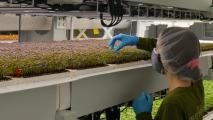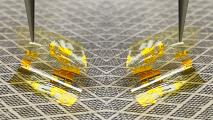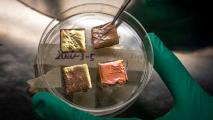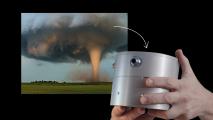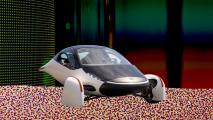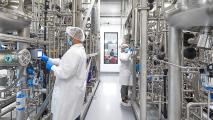
Energy
Energy powers civilization. Developing technologies that can deliver abundant, sustainable energy is the challenge of our time and the promise of our future. Failure is not an option.
More
The world’s largest vertical farm is opening in Pennsylvania
Upward Farms plans to build what will be the world’s largest vertical farm in Pennsylvania — and fish are going to fertilize its crops.
New biodegradable straws are made by bacteria
New biodegradable straws developed in China are as cheap as plastic, stronger than paper, and made from edible materials.
Clay from kitty litter pulls methane emissions from air
A new technology for reducing methane emissions in the atmosphere relies on zeolite, a cheap, abundant clay found in cat litter.
These solar panels are thinner than a piece of paper
Stanford University researchers announced they had achieved record efficiencies in a promising class of new materials for solar cells — which can be thinner than a piece of paper.
Cities are using beets to deice streets this winter
Cities across the U.S. are exploring less damaging rock salt alternatives — and beet juice is one of the most promising.
Earthships: The sustainable buildings made from trash
Interest in Earthships, a type of off-the-grid home built from old tires, is picking up as people look for ways to live more sustainably.
This battery may solve renewables’ energy storage problem
Flow batteries are a type of liquid battery that has the potential for large-scale, long-term energy storage. Researchers have found a new material for flow batteries and it looks a lot like molasses.
Series|
Just Might Work
Inside the lab inventing “coffee” without beans to save the planet
Almost all of the last wild forests will have to be destroyed to support the growth of coffee.
Batteries of the future could be made from trees
To improve battery life and safety, while maintaining ionic conductivity, researchers aim to replace the liquids commonly used in batteries with a solid material made from trees.
How buildings can adapt to the seasons
Scientists have invented an all-season smart-roof covering that keeps homes warm in the winter and cool in the summer. It uses a phase-shifting material that doesn’t require additional electricity.
Series|
Just Might Work
Tornado Alley miracle: A 100% accurate tornado sensor invented by accident
Can this recycled technology save the citizens of Tornado Alley?
Solar powered cars could soon hit the streets — but can they be efficient enough to go mainstream?
If they work, solar-powered cars could be great for the environment. Here’s the startups working to make that happen.
Floating drones mine carbon data in the Gulf Stream
Saildrone has deployed three vessels into the Gulf Stream this winter to collect data on carbon uptake.
Citizen keepers are raising threatened grasshoppers
The large marsh grasshopper risks extinction. But volunteer citizen keepers are raising the insect for rewilding to newly restored wetlands.
Inside the world’s most advanced cultivated meat facility
UPSIDE Foods (formerly Memphis Meats) is offering consumers tours of “the world’s most advanced cultivated meat production facility.”
These supergrids are uniting the world’s clean energy supplies
Europe is creating a supergrid across regions, countries, and oceans to smooth out the fluctuations in energy suppliers — and hopefully build more resilient power systems.
Paris to make the Seine River swimmable for the Olympics
Paris’ plan to make its iconic Seine River swimmable for the 2024 Summer Olympics could help other cities clean up their own waterways.
The world’s first indoor saltwater farm
But Sam Norton, founder of Heron Farms, is using the world’s most abundant resource — seawater — to grow sea beans.
Luminescent materials could cool our cities and light the streets
Luminescent materials could be used to cool our cities, and simultaneously cut down on electricity.
There’s a ton of wind power in the deep sea. Let’s go get it.
The most powerful winds can be found over the deep, open ocean. Floating wind turbines could tap into this and 100x our wind energy.
Get inspired with the most innovative stories shaping the world around us.



